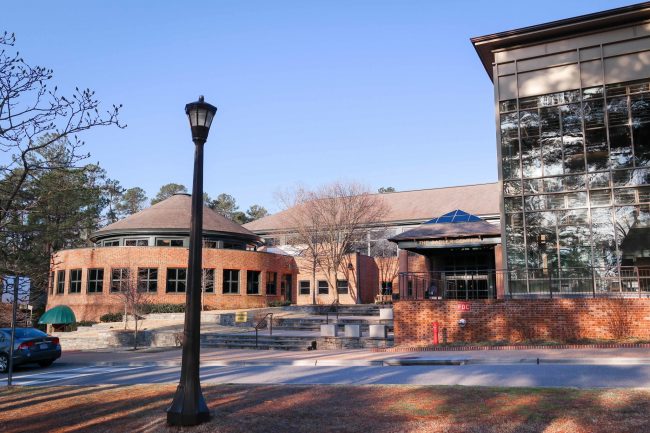For the first of three COLL 300 symposiums this fall, Guatemalan-American anthropologist Fredy Peccerelli visited the College of William and Mary. Peccerelli was on campus Sept. 17-21 but presented his main lecture Sept. 19 in Commonwealth Auditorium.
Peccerelli, who serves as the director of the Guatemalan Forensic Anthropology Foundation, also known as FAFG, works to exhume Guatemala’s longtime-hidden mass graves, a consequence of its 1960-1996 civil war, and helps to identify victims of the massacre so that they may be returned to their families for proper burials.
This semester’s COLL 300 theme, “Bodies that Matter,” focuses on what the College has identified as essential questions, such as: How do some bodies exert disproportionate force? How are bodies conceptualized differently in distinct contexts across the globe? What chain reactions in knowledge, power or organization ensue when new bodies are introduced into existing systems? How do bodies transform their surrounding environments? And how can scholars stimulate recognition of overlooked, undervalued or alienated bodies?
“I think that having this COLL 300 curriculum is amazing,” Peccerelli said. “It gives [students] an opportunity to learn things that are not taught in the classroom or maybe are not part of any specific class.”
“I think that having this COLL 300 curriculum is amazing,” Peccerelli said. “It gives [students] an opportunity to learn things that are not taught in the classroom or maybe are not part of any specific class.”
Peccerelli was born in Guatemala and was displaced along with his family in 1980 due to the country’s climate of political persecution. Peccerelli’s family moved to New York, and studying anthropology in college revived Peccerelli’s interest in Guatemalan history. Since he decided to move back to Guatemala to work on forensic anthropology research, he and his team have worked on identifying the approximately 200,000 victims of the civil war, a figure which does not include an estimated 40,000 disappearances. This work is not without risks — Peccerelli and members of his immediate family have received death threats for the work that he does.
“In Guatemala, being politically active would cost you your life,” Peccerelli said.
Part of the COLL 300 symposium included a question-and-answer session with history professor Betsy Konefal, who studies the vanished populations of Latin American countries. Together, the two addressed the theme and analyzed how the disappearances in Guatemala could help answer the question of whose bodies matter.
“It’s not about the bodies themselves; it’s about the survivors,” Peccerelli said. “Guatemalans have the right to learn about their own history.”
Students who are currently taking COLL 300 classes were required to attend Peccerelli’s talk, and some were required to complete additional assignments such as reflection papers.
Andrew Brockmeyer ’19 is taking Body Imaging, a cross-listed gender, sexuality and women’s studies and film studies COLL 300 course which looks at the portrayal of bodies in film. Brockmeyer said that he initially thought Peccerelli’s lecture would be unrelated to his course, but then began to see the connections to his course’s discussion of anatomy and anatomical symbolism.
“I am a government major and I was really fascinated by this,” Brockmeyer said. “I wish he talked a bit more about the criminal proceedings, which I understand is not what he does, and I understand he does not like talking about that side of it. He’s talking about the [Inter-American Court of Human Rights] and how we view [murders] and genocide internationally, and I thought this was fascinating.”
Another student, Katie Dawkins ’19, said that she saw more overlap between her COLL 300 course, Lesbian Fictions, and Peccerelli’s lecture.
“I do think it has a lot to do with marginalized people’s stories and how they do or don’t get told,” Dawkins said. “Because Fredy Peccerelli was saying a lot [about how] the work he does is about the living and the respect it returns to them to have their dead returned to them after decades, those they have not seen in decades. … A lot of what we do in my class is read the stories of people who could not be who they were in society. They found ways for their stories to be told. … It’s about their story being told after they’re gone and about who is left to remember them.”
Matthew Golder ’20 is taking the African Economic Development COLL 300 course and said that he sees similarities between issues discussed in the context of African development and in the context of Guatemalan development.
“When you think about the implications of colonialism and its effects on the development of Africa across centuries and even in recent non-economic history, you see the displacement of peoples, and the same is true for Guatemala,” Golder said. “The effects and after-effects are still being felt.”
“When you think about the implications of colonialism and its effects on the development of Africa across centuries and even in recent non-economic history, you see the displacement of peoples, and the same is true for Guatemala,” Golder said. “The effects and after-effects are still being felt.”
Peccerelli was selected in 1999 by CNN and Time Magazine as one of the top “50 Latin American Leaders for the New Millennium.” He has also contributed work to the exhumation of mass graves in post-war Bosnia and Herzegovina.
As part of the COLL 300 series, government minister, activist, poet and educator Bernedette Muthien will visit Oct. 10 to discuss strategies for reversing patterns of victimization through increased representation and government services. She has focused on women of color in South Africa and has worked to provide them with more resources. Oct. 17, micha cardenas, who studies borders, activism, algorithms and the reduction of violence against transgender women of color will visit. She has used science fiction and virtual reality to explore this violence. These two speakers will continue to develop on the “Bodies that Matter” theme.
— Flat Hat Operations Coordinator Kiana Espinoza contributed to this article.

